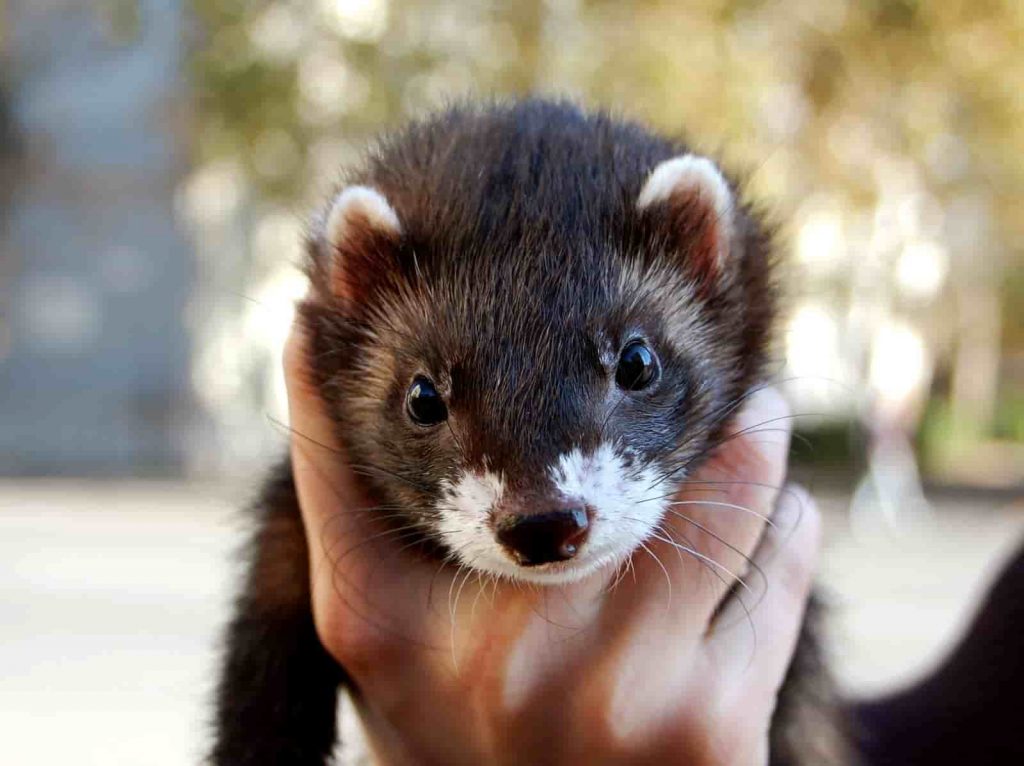Last updated on March 5th, 2023 at 01:48 am

Ever had the pleasure of meeting a ferret? These little guys may be small, but they sure pack a punch in the smarts department. As part of the Mustelidae family, which includes other cute critters like otters and weasels, ferrets are known for their intelligence, curiosity, and playfulness. But how smart is a ferret? These furry friends rank higher than cats and dogs. Ferrets are renowned for their resourcefulness and determination. They can even learn their names and respond when called. And with a bit of training, they can do all sorts of tricks, like fetching objects and walking on a leash.
If you talk to a ferret owner, they will tell you all about the sheer tenacity and creativity these animals display when given a small chance. But what makes ferrets stand out is their insatiable curiosity? What else can they do? Read on to learn more about how smart ferrets are and their abilities.
How Smart is a Ferret?
Ferrets are intelligent animals that can be trained to use a litter box, respond to their name, and learn basic commands. They are capable of playing simple games and can be taught tricks. Ferrets are social and curious creatures and can be taught to come when called, fetch, and even walk on a leash. They have an excellent memory, so they can remember what they have learned. In terms of problem-solving, ferrets are quite adept. They can be taught to open cages, and they have been known to learn how to manipulate locks. They are also known to solve puzzles, such as figuring out how to open a box to get to a treat inside. Overall, ferrets are quite smart animals. They can be trained to do a variety of tasks and tricks, and they can solve simple puzzles and problems.
Do Ferrets Communicate?
Ferrets are pretty adept at understanding their environment and the people around them. They have a variety of vocalizations and body language that they use to interact and communicate. For example, they can use a combination of vocalizations and body language to communicate a variety of different messages.
Vocalizations are one of the primary ways that ferrets communicate. They make a variety of different sounds that range from squeaks to growls. They use these vocalizations to alert other ferrets to danger, to express their desire to play, or even to request food or attention from their owners. Ferrets also use body language to communicate. They may flatten their ears, bunt their head against an object, or arch their back when they are feeling threatened or scared. They may also wag their tails when they are excited or happy.
Ferrets also use scent to communicate. They have scent glands around their face, back, and tail that secrete pheromones that help the ferret mark its territory and communicate with other ferrets. They may also use scent to show submission or dominance in certain situations. Ferrets are very social animals, and they use these vocalizations, body language, and scent to communicate with each other.
In terms of intelligence, ferrets can understand complex tasks given enough time and patience from their owners. They can be trained to do tricks like fetching objects or playing hide-and-seek games. Furthermore, ferrets have excellent problem-solving skills, allowing them to figure out how to open doors or cabinets if left unsupervised for too long.
How Are Ferrets Problem Solving Skills?
Ferrets are also smart enough to figure out complex tasks with time and patience. This can include figuring out how to open doors or cabinets if left unsupervised and learning tricks like fetching objects and playing hide-and-seek games.
One example of a ferret’s problem-solving ability is their ability to manipulate objects with its mouth and paws. This intelligence allows them to open doors, unlock cages, and even figure out how to get into places they shouldn’t be. Ferrets also have an excellent memory span which helps them remember the solutions to problems they’ve encountered.
In addition to being able to solve physical problems, ferrets also demonstrate emotional intelligence by forming strong bonds with their owners and responding positively when given attention or affection. Overall, ferrets are intelligent animals with good problem-solving skills. They can be taught to open latches, navigate mazes, and perform tricks.
Do ferrets Remember or Recognize Things?
Yes! Ferrets are intelligent creatures with impressive memory retention. They can remember their owners, toys, and familiar environments. They can even recognize the sound of their owner’s voice and can come when called. The most common way to test a ferret’s memory is to place a treat in a box, and if the ferret can remember where it was placed, it will go back to the box to find it. They can also remember if you take your ferret for a walk every day, it will soon learn to anticipate the activity and be excited when it’s time for a stroll.
What’s more, ferrets also love to explore new smells and sounds, so taking them out for walks is a great way to stimulate their senses. It’s essential to keep an eye on them, though, as they may hide things around the house – this is just part of their natural behavior.
So, can ferrets recognize their owners?
Yes. Ferrets are often seen as independent and aloof pets but can be surprisingly affectionate with their owners. They have the intelligence and problem-solving skills to recognize their owners and form strong attachments to them. Ferrets will bond with whoever gives them time and attention, whether one person or several people.
Their memory retention and curiosity allow them to remember their owners, even after long periods apart. They may show affection by licking or snuggling up to you when you’re around. With enough playtime and interaction, ferrets can become loyal companions who enjoy being around you.
What about their senses?
A ferret’s sense of smell is 40 times more powerful than a human’s, while their hearing is far superior to ours. Their keen senses allow them to hunt prey, detect changes in their surroundings, identify threats, and distinguish between familiar and unfamiliar scents.
Regarding sensory intelligence, ferrets can use their acute hearing to locate food or potential predators. They also can smell various odors related to health, allowing them to detect when something is wrong or out of the ordinary in an environment.
It gets even better – they also possess a remarkable sense of sight; they can detect color variations and perceive the differences between objects of various shapes and sizes. This capacity allows them to store knowledge of where food is located in their enclosure or discover secure spots from other creatures or predators.
Ferrets are also quite agile animals with excellent coordination skills that help them navigate through complex tunnels, move swiftly without getting lost, and even catch small prey in a single bound. This agility, combined with their sharp senses, gives ferrets an advantage over many other animals in finding food and identifying potential threats in the wild.
The combination of good eyesight, smell, and hearing indicates that ferrets are quite intelligent creatures who rely on instinctive behaviors and learned information for survival.
For example, ferrets will often remember where they found food before so they can return later for more. That suggests these animals can learn from experience like other mammals. All this makes it clear why people often describe these smart animals as “ferociously savvy.”
Do Ferrets Hunt
Hunting is an instinctive behavior observed in many species, including cats, dogs, and ferrets. But how smart is a ferret when it comes to hunting? To answer this question, let’s compare the hunting abilities of ferrets to those of cats and dogs.
When it comes to hunting, cats are widely known for their agility and speed. They can quickly spot prey from far away and use their sharp claws and teeth to catch them. Dogs also have excellent hunting skills due to their strong sense of smell and powerful jaws. They can track down prey with ease and capture them quickly.
Ferrets have different hunting abilities than cats and dogs. While they may not be as fast or agile as cats or as powerful as dogs, they make up for it with their intelligence. Ferrets can think strategically when it comes to catching prey. They use their keen senses of sight, smell, and hearing to detect potential prey before pouncing on them with precision.
When a ferret spots its target, it will often stalk its prey until it gets close enough for an attack. It will then lunge forward with its sharp claws extended to grab its meal. Once the ferret has caught its prey, it will usually carry it back home to eat later.
Ferrets also can hunt in groups if necessary. This allows them to cover more ground while searching for food and increases the chances of success when catching prey. The ferret’s intelligence makes it capable of understanding complex tasks such as tracking down multiple targets at once or working together with other animals to capture larger game animals like rabbits or squirrels.
Can Ferrets be Trained?
Ferrets are known for their curious and friendly nature, making them suitable pets for many. But one of the most common questions asked by potential ferret owners is whether or not they are trainable.
According to Dr. Jennifer Coates, a veterinarian with over 20 years of experience, ferrets can be trained to do simple behaviors such as coming when called and using a litter box.
How do you train a ferret?
Ferrets are intelligent and curious creatures, making them an ideal pet for those who are looking for a unique and fun companion. Similar to other animals, ferrets can be trained to do a variety of behaviors and tasks. The first step in training your ferret is to establish a trusting relationship. Ferrets are naturally skittish and may be scared of humans at first, so it is important to introduce them to you and your home in a calm and gentle manner. Take the time to get to know your ferret and allow them to become comfortable with your presence.
Once your ferret is comfortable with you, you can begin basic training. The best way to do this is through positive reinforcement. This can include offering treats as rewards for desired behaviors. Ferrets are also very responsive to verbal cues, so you can say words like “sit” or “come” and reward your ferret when they respond correctly. Some ferrets can even be trained to use a litter box. Start by placing your ferret in the litter box after they wake up or after meals. When they use the litter box, reward them with a treat or verbal praise. When training a ferret, patience is key. Also ensure that the sessions are short and fun and provide plenty of playtime.
RELATED: How To Train A Ferret Not To Bite?
Conclusion
Ferret is a very smart animal with various abilities and skills, making them great companions. They have excellent eyesight and hearing, can learn complex tasks with time and patience, and demonstrate problem-solving skills in various scenarios. Ferrets also form strong bonds with their owners and respond positively to affection or attention. All these skills and abilities show just how clever ferrets are smart.


